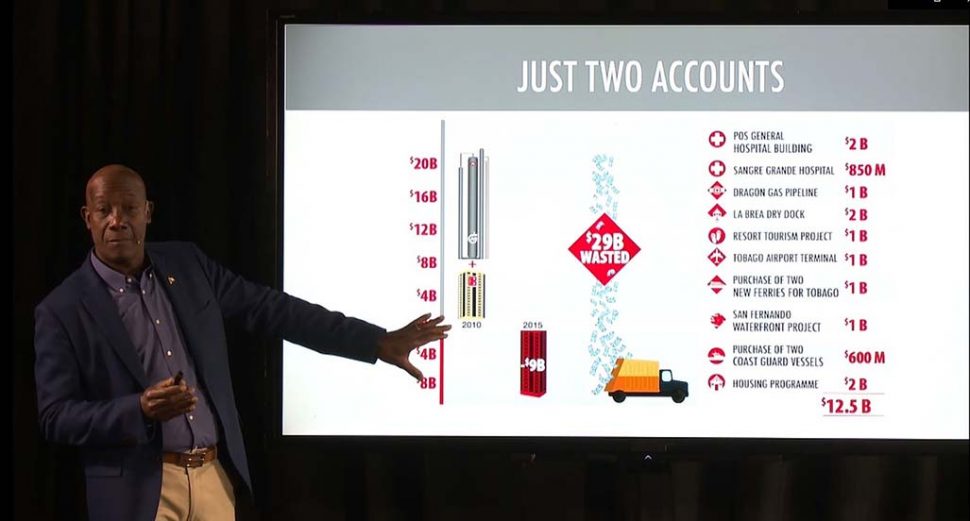(Trinidad Guardian) The Government is not magic, the Government is management.
These were the words used by Prime Minister Dr Keith Rowley to end the first half of his two-part televised lecture series on the economic status of the country.
Rowley spent the majority of the first hour of his pre-recorded “Mind Your Business: A Report To The Nation,” discussing the economic situation that he and his People’s National Movement (PNM) Government inherited from the People’s Partnership, upon entering office in 2015. He also focused on how his Government approached the daunting situation and its proposals for stimulating the economy over the next two years.
Armed with a power point presentation of graphs and diagrams, compiled from data from several Government ministries, Rowley sought to prove his case that irresponsible borrowing and expenditure coupled with falling energy revenues and production between 2010 and 2015, were the main contributing factors to this country’s economic downturn.
“It was a situation where you spend all that you earn, borrow some and spend that too,” Rowley said during his animated presentation, which was filled with stiff criticism of his political colleagues’ questionable economic policies.
Rowley stated that the external factors in the worldwide oil and gas industry were exacerbated tax breaks offered to energy companies by the former government, with revenues falling from $17 billion in 2014 to $1 billion in 2016.
“What this did was whatever taxes we were liable to get going forward, even in a different situation, we gave that up in those concessions,” he said as he noted that his government was working on renegotiating the deals.
“Those discussions are open, we have had some agreements so far and they continue in some areas,” he said.
Rowley also stated that in 2015, T&T’s monthly government expenditure was approximately $5 billion with $4.75 billion in revenue and $250 million in loans. According to Rowley, the current figure stands at $4.3 billion in expenditure, $4 billion in revenue and $300 million in loans.
“It does not matter who you voted for or where you live, the country could not continue like that otherwise the country would end up in bankruptcy,” Rowley said.
He also noted that his Government was able to immediately save $50 million a year by reducing the size of his Government from 33 ministries to 23.
“We had to cut the waste and corruption and we made decisions to increase revenue,” Rowley claimed.
He went on: “Some jobs would be lost, some businesses would have to struggle, but we must do what the revenue allows us to do and to do it on a sustainable basis.”
While Rowley stated that his Government was able to reduce the monthly expenditure through austerity measures, it still had to borrow in an effort to pay public servants, to provide social services for citizens and stimulate long-term economic growth.
However, Rowley was careful to note that his Government was engaged in responsible borrowing unlike the short-term arrangements utilised by the previous government in the run-up to the 2015 general elections.
“We are reducing the amount we are borrowing, not because we don’t want to spend, but we want to bring the economy to a position of stability where we can, year after year, seek economic growth,” he said.
He revealed that during that period, the Government borrowed $ 4 billion for several State enterprises including the Estate Management and Development Company (EMBD), Caribbean Airlines, the T&T Electricity Commission (T&TEC) and the National Carnival Commission (NCC). He said that the previous government also saddled his with $5 billion in debt by completing salary negotiations with public servants on the eve of the election.
“They were given a pay increase and the money was not there,” he said.
Rowley also alleged that between 2010 and 2015, the previous government wasted $29 billion in cash-$16 billion from the National Gas Company (NGC), $6 billion from the Central Bank and $9 billion in overdraft facilities.
“In fact, before the elections, they went into the NGC four times,” he said as he noted that the Government usually receives an annual payment as the majority shareholder.
As he questioned what the funds were used for, Rowley claimed that they could have been better utilised on projects that would stimulate and diversify the economy.
“They have the unmitigated gall to tell this government and you the people to put them back to continue doing this,” Rowley said.









